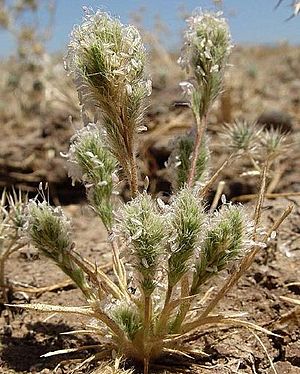Sacramento Orcutt grass facts for kids
Quick facts for kids Sacramento Orcutt grass |
|
|---|---|
 |
|
| Conservation status | |
| Scientific classification | |
| Genus: |
Orcuttia
|
| Species: |
viscida
|
Orcuttia viscida, also called Sacramento Orcutt grass, is a very rare type of grass. It is special because it only grows in one small part of the world. This grass is known for being sticky and having a unique look.
Contents
Where Sacramento Orcutt Grass Lives
This special grass is found only in Sacramento County, California. When a plant or animal lives only in one specific area, it is called endemic. Sacramento Orcutt grass grows in places called vernal pools.
What are Vernal Pools?
Vernal pools are shallow, temporary ponds that fill with water during the rainy season. They dry up later in the year. These unique habitats are very rare and are becoming even rarer. Many plants and animals depend on them.
Why This Grass is Endangered
Because its home, the vernal pools, is disappearing, Sacramento Orcutt grass is in trouble. People are building new homes and cities, which takes away these important habitats.
As of 1997, two of the nine known groups of this grass had already disappeared from their original spots. This is called local extinction. Because of this, the government officially listed it as an endangered species. This means it is at high risk of completely disappearing from Earth.
Since then, one more group of the grass has been found. Now, there are eight known groups of Sacramento Orcutt grass still alive.
What Sacramento Orcutt Grass Looks Like
Orcuttia viscida is a small plant. It is an annual grass, meaning it grows from a seed, flowers, produces seeds, and then dies all in one year.
Size and Texture
This grass forms sticky, hairy clumps. It can grow up to about 10 to 15 centimeters tall. That's about the height of a pencil! The grass feels sticky because it has special glands. It also has a unique smell.
Flowers and Seeds
The grass's flowers grow in a small, crowded cluster. This cluster is called an inflorescence. Each tiny flower part, called a spikelet, has a pointy tip. These tips are called awns. As the plant matures, these awns curve outwards. This makes the flower cluster look bristly, almost like a tiny brush.


